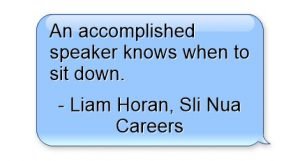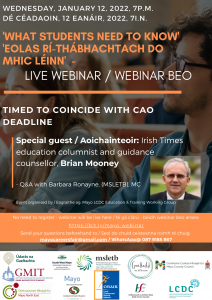By Liam Horan, Public Speaking & Presentations Trainer, Sli Nua Careers

Q: I’ve been asked to address a conference on behalf of my company – it’s a company promotional event and will be attended a lot of existing and potential customers, as well as some media figures who report on our sector. My topic is to discuss the progression of the company from being a two-man operation to what it is now – a thriving leader in our industry with over 160 people employed.
The boss has been loose enough in terms of direction, apart from telling me that I have ‘about 15 minutes’. That sounds like a lifetime to me. Any thoughts? (DK, email).
A: Gas fills any container into which it is put: a public speaker need not be the same, writes LIAM HORAN, Career Coach, Sli Nua Careers.
Just because you’re allotted 15 minutes to speak doesn’t always mean you have to fill it.
Will 15 minutes result in you diluting your message?
Will you struggle to fill the slot?
Will your audience stay interested?
Will your audience stay awake?
Will you?

Accomplished speakers know when to shut up and sit down.
They know the value of making an impact and stopping – they leave their audience wanting more and they show respect for the same audience by not hammering home their point.
It sounds like you could easily run a bit shorter. Given the looseness of your boss’ instruction, it doesn’t appear like you are working to a water-tight schedule – so you can craft your speech to whatever length you feel it deserves.
The organisers might be delighted if you wrap it up quicker.
I would focus on telling the story in as few words as possible. Think about the critical path – the elements of the story you need to include so that it is coherent, easily followed, logical and entertaining.
Avoid trips down unnecessary culs-de-sac. Every sentence must earn its keep. Be mindful of the law of diminishing returns and recognise that point beyond which everything you say ends up taking from, not adding to, the story.
In this scenario, you think you are helping the audience by telling them everything. You’re not: you’re confusing them and you’re probably losing them. They haven’t the same knowledge of the story as you have; nor, by and large, do they have the same level of interest as you have.
They’re out to enjoy their afternoon or evening. You can make it a more enjoyable event by getting the length of the speech just right – and, of course, the tone, too.
Do your audience a favour by serving up the best bits of the company history – the memorable events, the truly dramatic occurrences, the great triumphs, the deep disappointments. A speech, such as the one you are making, DK, is not the spoken equivalent of a court stenographer’s record.
To tell the best bits effectively, you must leave out the less interesting parts. Be brutal in how you edit your speech.
A tighter slot will force you to prune so that your speech has no excess fat on it – and, consequently, you will prepare and deliver a better speech.
The audience will be very grateful – and, if you charm the place with a great story well told, the boss will likely thank you too.
Public Speaking & Presentations Masterclass (Open) programme.






